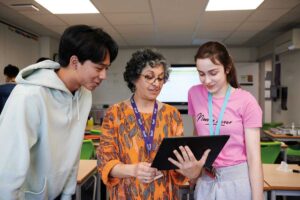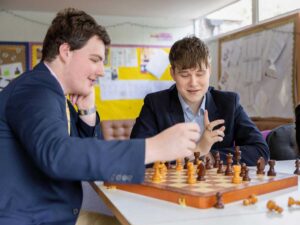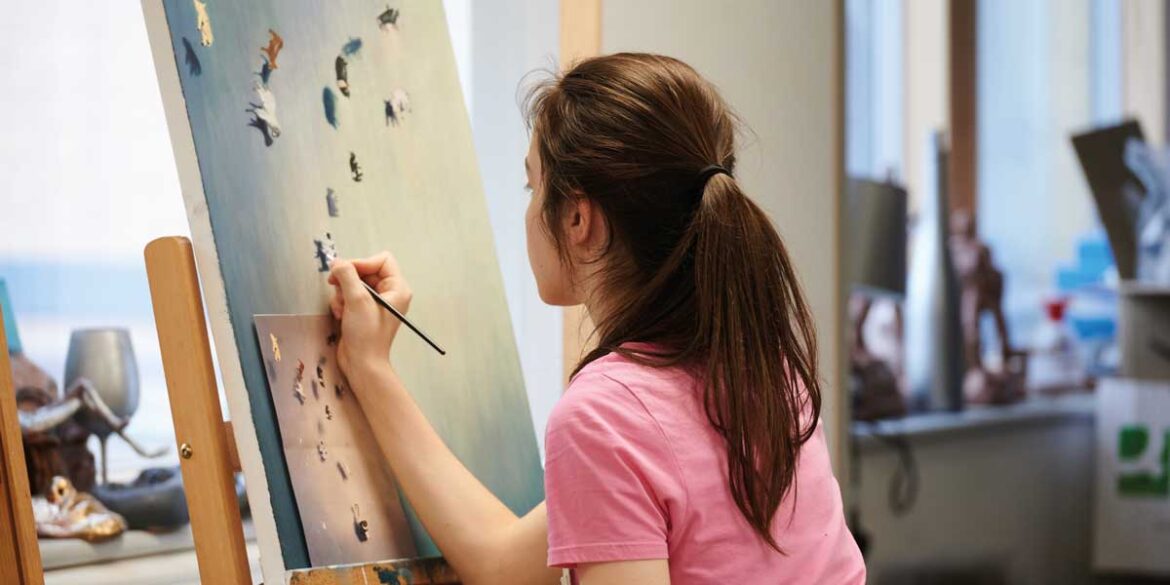Sixth form is an opportunity for young adults to develop their passion for learning, working in synergy with teachers and fellow students. Charlotte Phillips asks the experts what’s involved
During their two years in sixth form, students’ relationships with education undergo a profound change. They become more independent and take charge of how and what they learn in a completely new way. For the first time, they can choose to study the subjects they love – a choice often made with their future studies or career goals in mind.
 Behind the scenes is a small army of teachers on hand to guide, challenge and support students over their two sixth form years. They not only help students cover academic ground, but do much of the heavy lifting that goes into helping them transform into young adults. By the time they finish their final year, students should be equipped with the skills needed to move successfully into the next phase of their lives, getting them study, work or apprenticeship ready.
Behind the scenes is a small army of teachers on hand to guide, challenge and support students over their two sixth form years. They not only help students cover academic ground, but do much of the heavy lifting that goes into helping them transform into young adults. By the time they finish their final year, students should be equipped with the skills needed to move successfully into the next phase of their lives, getting them study, work or apprenticeship ready.
Perhaps this is why – though dedicated teachers abound at every single stage of the academic journey – sixth form specialists radiate a particular enthusiasm for their role. Ask what motivates them and they’ll cite the excitement of acting as agents of change. They preside over a kind of alchemy as the students in their charge transform, often dramatically, during the sixth form years.
Students arrive in year 12 “just out of their stripy blazers,” says Alice O’Donnell, director of sixth form at Kimbolton School. “They leave at the end with A-level results in hand, ready to go off to university, so it’s an exciting and transformative two years for them. It’s one of the things that thrills me about the role.”
That growth makes those two years at the top of the school stand out. “Between the ages of 16 and 18, so much change goes on. Students discover what they like and don’t like and their personalities develop,” says Jacqueline Paris, head of sixth form at Stephen Perse Cambridge.
While a huge amount of effort goes into the formal subject lessons themselves, Jacqueline stresses that there’s so much more on offer. “We’re very conscious of developing the student as a whole, beyond just qualifications. It’s so easy to focus, during these sixth form years, on just the academic side of things and the university goals. Actually everything, both within and outside lessons, makes a difference.” From mentoring programmes to clubs, extension work to sport and social activities, this whole range “contributes to students finding their feet and their way.”
At Felsted School in Essex, there’s an understanding that absorbing knowledge is of no use without the skills and sensitivities to apply it in real-world situations. “There is an all-pervading emphasis on developing the personal attributes and independence of mind that will enable each student to make active contributions to society and find fulfilment in life,” says Jack Dougherty, director of marketing at Felsted. “Sixth formers lead the way in sports and arts activities, as well as the school’s Combined Cadet Force, Duke of Edinburgh and Model United Nations event. This allows them to practise decision-making, team-building and communication. They also initiate and run their own fundraising events for charity and volunteer for good causes.”
Nowadays, students are far better prepared for life after school than used to be the case. This is thanks to a combination of changes to what is being taught, among other factors including schools gaining new technology and insights into what their students need and how to provide it. “Teaching has evolved massively over the past 20 years,” states Jonathan Beckett, deputy head academic at Stoke College. “Our understanding of the next stages of students’ lives is really important and I feel that’s seen a huge improvement.”
It’s helped by the way sixth form is structured, with smaller classes containing students and teachers who share a passion for a particular subject. “Students are with other people who, like them, really want to do the same subject, so you’re surrounded by kindred spirits,” says Kimbolton’s Alice O’Donnell. “Since it’s a smaller class size, you have a much more seminar-style lesson with more interaction between each other and the teacher. Everything’s much more convivial and collaborative, and there’s more of a round-table feel.”
 As students start to appreciate this sense of working together, life in sixth form begins to seem far less daunting, according to Ellen Hesse, principal of Abbey College. “Telling students that teachers are on their side isn’t enough,” she says. “They need to experience it first-hand. Once they understand that teachers will listen and talk to them with respect, they usually start to trust them. At graduation, students are celebrating their A-level results as a team with the teachers.”
As students start to appreciate this sense of working together, life in sixth form begins to seem far less daunting, according to Ellen Hesse, principal of Abbey College. “Telling students that teachers are on their side isn’t enough,” she says. “They need to experience it first-hand. Once they understand that teachers will listen and talk to them with respect, they usually start to trust them. At graduation, students are celebrating their A-level results as a team with the teachers.”
During the two sixth form years, there is also an evolution in how students learn. Instead of regurgitating facts, they are encouraged to become problem-solvers, something hugely important for A-levels and beyond, mentions Jonathan Beckett. “High-level universities ask students lots of questions they haven’t seen before. How they think and being able to tackle problems they’ve never seen before by applying knowledge is really important.”
Getting to this point involves getting comfortable with discomfort, Jonathan explains. That means building resilience and overcoming students’ understandable reluctance to fail. At Stoke College, that’s being addressed head on. “I rewrote our vision plan and one of the key points I want students to understand is that it’s OK to fail, because you learn from failure. That’s when the best learning happens. You don’t learn from success.”
Helping students move beyond recalling knowledge and learn how to apply it really matters. Stephen Perse Cambridge runs an Introduction to Knowledge course in which sixth formers can explore some profound concepts. “We ask them to think about what we mean by truth and proof, how we look at evidence in science compared to history and whether we know things intuitively through memory or language,” says Jacqueline Paris. “It helps students move from being GCSE students to being ready for the world beyond and going to university.”
Schools also encourage students to engage in original research by picking a topic that might be relevant to their planned degree course or a subject that they aren’t taking for an A-level but still love. Some schools offer this as an EPQ (extended project qualification) while others offer their own team-based versions. Whatever the format, the goals of these projects – getting outside students’ comfort zones, encouraging originality and introducing them to a more advanced way of working – does wonders for their sense of independence. It also boosts their confidence and helps them stand out. “It’s a vital part of students’ education now,” reveals Jonathan.
While some students produce a long essay, others create artefacts such as computer programmes. Whatever the end product, it will be unique and research-driven. “They have to learn the academic writing skills to present their project and will take those forward into university,” Jacqueline asserts.
Abbey College brings together students with shared interests in topics like engineering or architecture in order to undertake a research project as a team. This involves the skills of communication and collaboration. “We want them to discuss things, challenge their own thinking and learn from one another,” says principal Ellen Hesse. “At the end of their project, they have to stand in front of the whole school and present the outcome of their research in a way that a non-specialist would understand. Through this, they are taught how to adapt their language for different audiences.”
During their time in sixth form, students will also try a range of leadership roles on for size. At Stoke College, sixth formers train to become Stoke Listeners. “This provides a platform for younger pupils who don’t always want to talk to a teacher to share their worries with somebody older who is ready to listen and help,” says Jonathan Beckett.
Abbey College’s sixth formers are involved in everything from student leadership teams to running homework sessions. They might also organise and lead student conferences for schools and colleges from across our region, under themes such as diplomacy. “Student leaders are chosen for the qualities they model to others,” says Ellen. “Kindness and respectful behaviour, helpfulness and patience are valued in our community. There’s no point having a leader with a big ego because that doesn’t help anyone.”
When all this thought and effort goes into planning sixth form programmes, it’s unsurprising that seeing students gain confidence and maturity, becoming well-equipped for life after school, is a hugely rewarding experience for their teachers. For Ellen, a major highlight is seeing how hard students work to achieve their dreams and how they deal with setbacks along the way.
For Jacqueline Paris, it’s all about that butterfly moment when students are finally ready to go off and face the world. “The sixth form is transformational,” she insists. “It’s the time when students identify where their passions lie and prepare to explore them further. It’s seeing them leave school ready for the world ahead that gives me the greatest pleasure.”

